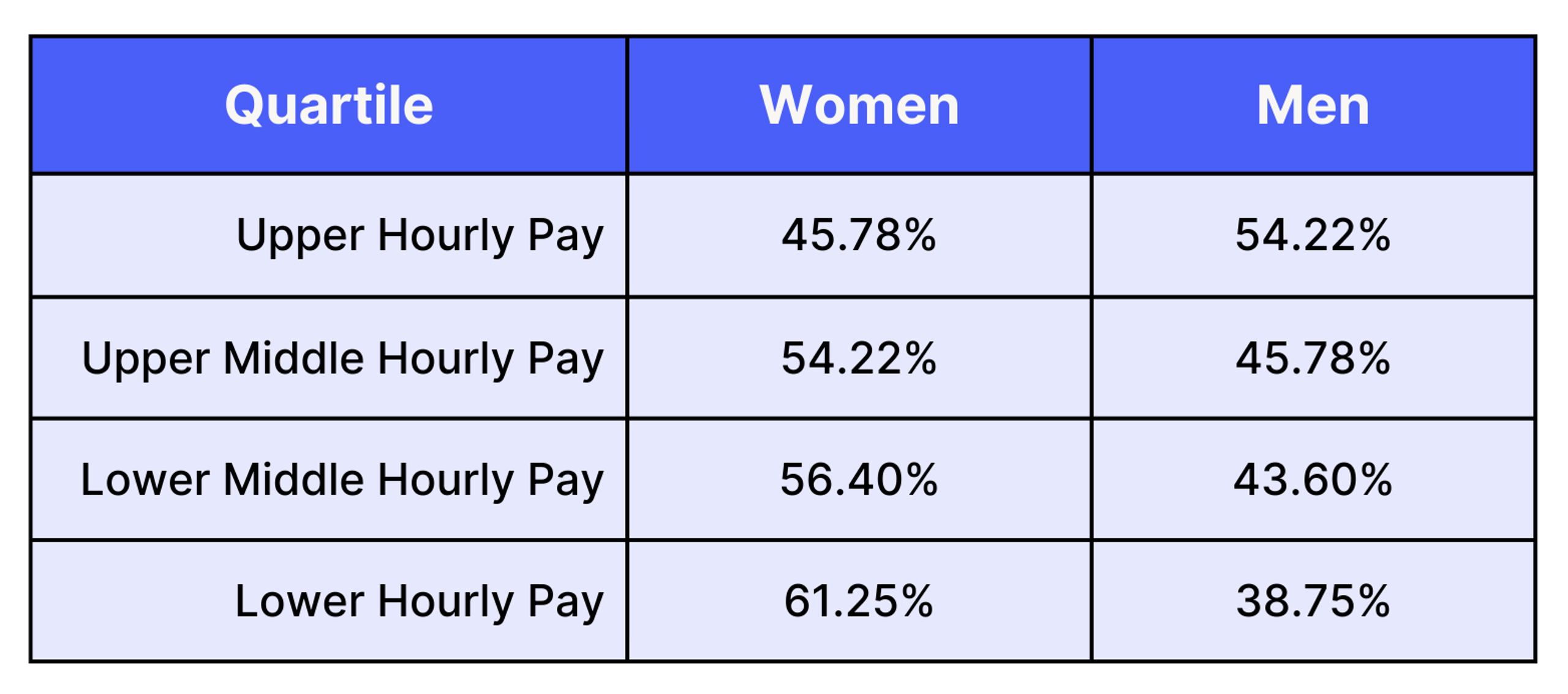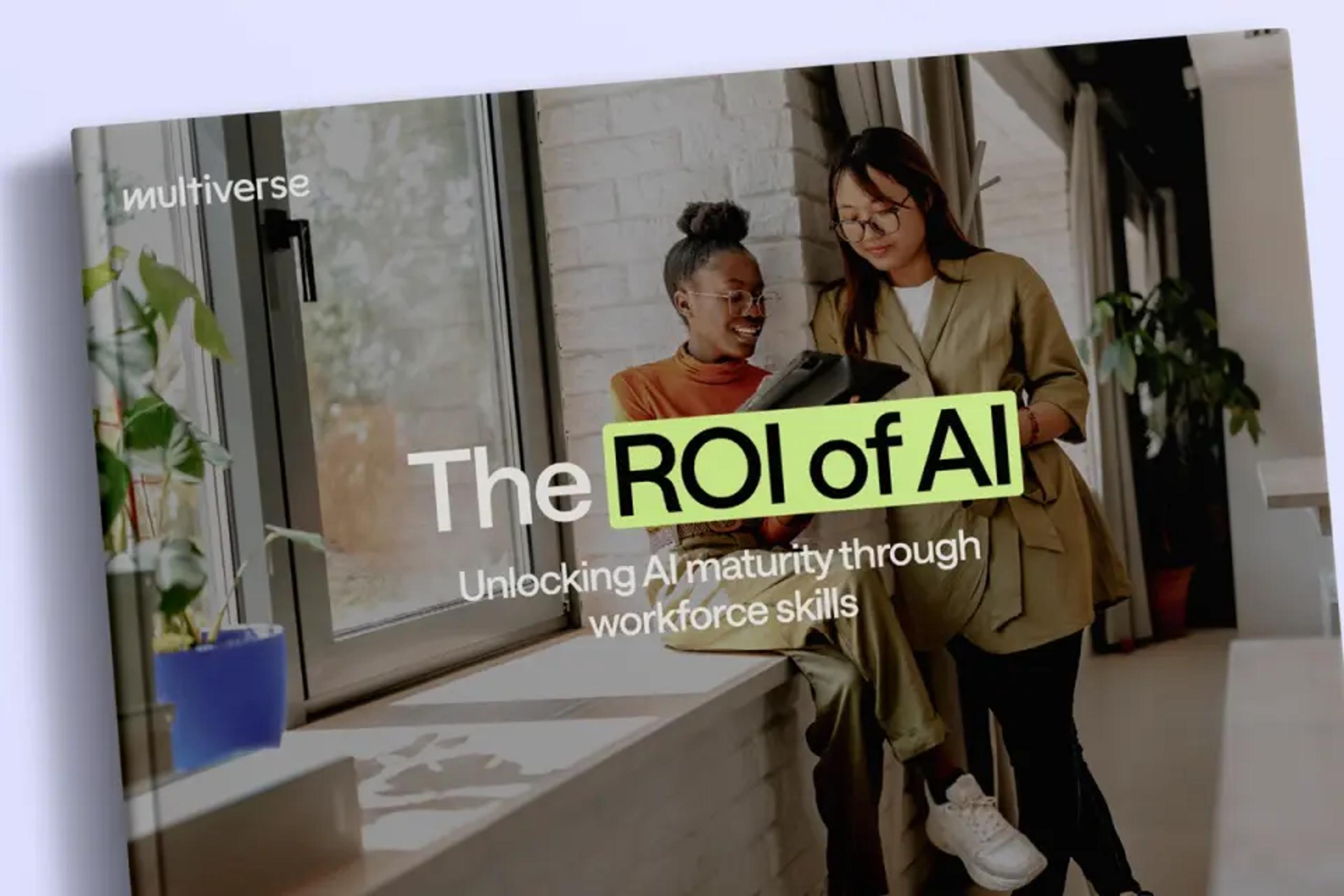This week, we reported our gender pay gap for the 2022-2023 tax year. This year's report offers a snapshot of the gender pay gap at Multiverse, as of 5 April 2023, the UK government's date for reporting. At that time, we had 664 people in our UK team - 361 women and 303 men.
The Gender Pay Gap explained
First - some technical bits. The gender pay gap is the difference in the average hourly wage of all men and women across a workforce. The gender pay gap is not the same as unequal pay which is paying men and women differently for performing the same (or similar) work. Unequal pay is illegal and has been in the UK since 1970.
At Multiverse, we welcome people of all gender identities and expressions. HMRC specifies that Gender Pay Gap data sets should only include people who identify as a man or woman, and do not currently include non-binary individuals. So for the purposes of this report, we have aligned with these guidelines, despite this approach not being in line with our internal practices.
Sharing our data
As a reminder, this data is retrospective and looks at the gender pay gap at Multiverse between 5th April 2022 - 5th April 2023.
In the UK, Multiverse’s mean gender pay gap was 11%. The mean is the average pay of women and men. On average, the pay of a man at Multiverse was 11% higher than the pay of a woman.
Multiverse’s median pay gap was 7%. The median compares the midpoints in the ranges of women's and men’s pay. At Multiverse, the median man had pay 7% higher than the median woman.
While our mean gender pay gap was lower than the average for UK tech(opens new window) (16%), as a mission-driven organisation, we know the job here is never done. In this post, we’ll share the details behind the data and what we’re doing to improve.
Explaining our data
Our gender pay gap increased in 2023 compared with our 2022 results because our business, and who we hire, is changing. Our investments in technology mean we are hiring more people from areas traditionally dominated by men, particularly sales and software engineering. This means we are colliding with the systemic issues Multiverse exists to solve.
According to the Tech Talent Charter 'Diversity in Tech' report(opens new window), women make up 29% of the UK tech industry. At Multiverse in 2023, 35% of our Tech team (Engineering, Product and Data & Insight) were women. In 2022, we reported that 31% of our Tech team were women. This year-over-year improved gender representation highlights our commitment to attracting and sourcing diverse candidates, equitable interview practices, and employee retention strategies.
We will continue to focus on increasing the gender diversity in our engineering and product teams. These roles are some of the highest paid in the industry, so with efforts to hire more women into these teams, we should see our pay gap start to close.
Another contributing factor to our gender pay gap was that we saw a decrease in women at “Director” and above levels. Representation at these levels changed from 69% women in April 2022 to 58% in April 2023. We also saw representation of men at our “Principal” level change from 36% to 47% during this time period.
To understand this data better, we can look at how women’s and men’s pay was distributed. To calculate this, we have split all of our team members into pay quartiles and worked out the proportion of men and women in each quartile. Overall, we have more men in our highest paid roles and more women in our lowest paid roles.
Gender breakdown by pay quartile

At the time of reporting, just over half of Multiverse employees received a bonus: 55% of women and 50% of men. Multiverse’s mean gender bonus gap was 34%. This means that on average, the bonus of a man at Multiverse was 34% higher than the bonus of a woman.
The median gender bonus gap was 11%.This means, the median man at Multiverse had a bonus 11% higher than the median woman.The large difference between the mean and median reflects the irregular distribution of bonuses, including some outliers. Effectively a small number of men received proportionally larger bonuses.
The reason behind our gender bonus gap was because Multiverse’s highest bonus receivers were in our Sales team, and at the very top of the scale in this team, women were underrepresented. Additionally, Multiverse employees choose whether to progress their careers as individual contributors or move into management roles.Many of our top performers in Sales who are women choose the management pathway - this is great, as we want more women in leadership overseeing male dominated areas, as it will hopefully encourage the next generation of women to join these professions.
However, as the bonus structure is different for a manager role compared to an individual contributor, this had an accelerating impact on our gender bonus gap.
Our US team data
Gender pay disparities are a global problem, and as a global organisation, we believe it’s important to voluntarily share the gender pay gap for our US team, even though this is not a government requirement. On the snapshotreporting date of 5 April 2023, we had 138 employees in the US.
In the US, Multiverse’s mean gender pay gap was -8%. This means that on average, the pay of a woman at Multiverse in the US was 8% higher than the pay of a man.
Our median gender pay gap was 5%, this means the median man at Multiverse in the US had pay 5% higher than the median woman.
Our approach to gender equality
We’ve been committed to creating an equitable and inclusive workplace since we were founded in 2016. We have a number of initiatives in place to ensure that equity is at the forefront of our People strategy, and we’ll continue to prioritize this work to improve our gender pay gap for the future.
- Pay philosophy - A pay philosophy is the strategic approach that guides an organisation on how to attract, retain, motivate, and reward employees. This philosophy is the guiding force behind all compensation decisions and we have a number of principles in place to ensure our approach is holistic and equitable. One of our principles is transparency. Pay transparency is beneficial both to the organization - in the consistent and equitable application of our pay practices - and to our employees by giving them insight into their position and what their future career path looks like. Pay transparency is a journey, not a sprint, and we’ve been progressing on our journey over the last 18 months. So far, we have created consistent pay bands and managers have communicated to their direct reports what their pay band is, where they sit in the band and how this has been calculated. We’re continuing to progress with this work and are moving towards even greater transparency.
- Inclusive hiring practices - We have recently launched a new hiring framework and interviewer training module to ensure that consistency and inclusivity are at the heart of our hiring process. We also actively partner with a number of organisations for underrepresented communities, including Black Young Professionals (BYP) Network and Flexa, to improve the diversity of our talent pool. Specifically in sales and engineering, we’re focused on attracting and sourcing candidates from a diversity of backgrounds, as we know that these roles have been traditionally dominated by men.
- Leadership development - For us, it's essential to create equitable opportunities for progression for team members from backgrounds currently underrepresented in our leadership teams. We run a 12-month Leadership Accelerator programme that offers mentorship, sponsorship and coaching to support Multiverse employees who hit specific demographic criteria, on their leadership journey. We’ve had two successful cohorts of this programme and we’re looking forward to launching the 3rd cohort soon!
- Equitable performance reviews - We believe that having our eyes open to potential bias in the system is critical to creating equitable outcomes. We have therefore introduced a structured performance appraisal process, with clear expectations and calibration across teams. By applying rigour to this process, we are able to make more accurate decisions for all employees regarding their pay, performance and progression.
Conclusion
While reporting our gender pay gap for the 2022-2023 tax year provides an important moment for us to reflect, our diversity, equity and inclusion efforts are a critical part of every day life at Multiverse. As a mission-driven organisation, we’re striving to provide equitable access to opportunities for everyone - and this work will never be done.








